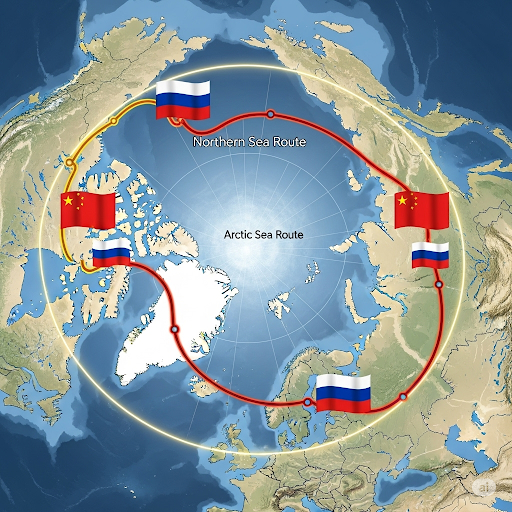Beyond the Alliance: Why Russia should beware of China's ambitions in the Arctic
- Gabriele Iuvinale

- 2 ago 2025
- Tempo di lettura: 4 min
Cooperation between Russia and China on the North Sea Route (NSR) offers Russia opportunities for economic and strategic development, especially after Western sanctions pushed Beijing to become the main user of the route. However, this partnership exposes Russia to significant risks: potential economic dependence on Beijing, vulnerability to external political pressures, and the risk of “dual-use” infrastructure
The Arctic region is emerging as one of the most important areas of strategic interest and international cooperation, particularly between China and Russia. The Polar Silk Road (PSR) initiative, centered on the development of the Northern Sea Route (NSR), is a crucial element of their partnership. This ambitious collaboration is based on a deep convergence of strategic interests, although it must confront complex geopolitical challenges that directly influence its development prospects.
The Strategic Relevance of the NSR
The NSR is the shortest maritime route for transporting goods between Asia and Europe, offering a potentially more efficient and secure alternative to traditional routes. Due to global warming, the route is becoming increasingly accessible. Forecasts indicate that the number of navigable days without icebreaker assistance will increase from 67 in 2020 to 135 in 2080, while with assistance, it will increase from 140 to 320 days in the same period.
Traffic data show growing economic potential. Although the volume of shipments on the NSR is still modest , the total cargo volume has increased significantly between 2017 and 2019, stabilizing at an average of 33.3 million metric tons per year until 2022. Cargo traffic nearly doubled from 5.392 million tons in 2015 to 10.691 million in 2017, reaching 31.5 million tons in 2019.

Geopolitics and the Emerging Role of China
International sanctions imposed on Russia following the conflict in Ukraine in 2022 drastically altered the NSR traffic landscape. Although the number of voyages and total cargo weight increased by 2.93 and 4.29 times, respectively, between 2018 and 2023, the diversity of participating countries decreased significantly. In this context, China emerged as the main user of the route , with its share of transit cargo on the NSR jumping from 31.68% in 2018 to 95.24% in 2023. This growth underscores China's crucial role in the future operations of the NSR.
For Russia, the Arctic is a matter of "special interest" and national security , claiming sovereignty over vast areas and treating the NSR as an "inland sea." China, while formally respecting the sovereignty of Arctic states, sees the region as a potential "lifeline" in the future should great power rivalry restrict sea lines of communication in the Indo-Pacific. Its growing presence is viewed with suspicion not only by Arctic states but also by Russia itself.
Risks and Vulnerabilities in Russia's Cooperation with China
Despite the promise of development, the partnership with China exposes Russia to significant risks, as highlighted by a risk analysis based on case studies of Chinese investments abroad.
Dependency Risk: Although the Russian economy is more robust than that of many low-income countries , exogenous events like sanctions or currency volatility could lead Russia to excessive dependence on China. The case of Sri Lanka's Hambantota port, leased to a Chinese company for 99 years after the government failed to repay its debt, serves as a cautionary tale.
Coercion and Political Influence Risk: The strategic partnership between the two countries suggests a low probability of mutual coercion. However, the intervention of third parties, such as the United States, can complicate this dynamic through sanctions and diplomatic pressure. This makes political coercion a significant risk factor to be monitored.
Cybersecurity Risk: The increasing digitalization of Arctic infrastructure, necessary for efficiency, exposes Russia to new risks of cyberattacks and data leaks. Chinese investments in critical sectors raise concerns about access to sensitive infrastructure and potential espionage threats.
Hard Security Risk ("Dual-use"): While military cooperation between China and Russia is primarily driven by economic interests, the potential for "dual-use" of civilian facilities for military purposes cannot be ruled out. The strengthening of Russia's Northern Fleet and China's ambition to develop a blue-water navy raise concerns about a potential future Chinese military presence in the region.
Geopolitics and Conflicting Regulations
Sanctions imposed on Russia have had a direct impact on cooperation projects. In 2022, Sinopec, a Chinese state-owned energy company, reportedly suspended discussions on a $500 million chemical plant with Russia's Sibur. Similarly, COSCO, which had announced plans in 2019 to operate 14 commercial container ships on the NSR, had "zero passages" in 2022, a fact that correlates with the imposition of sanctions.
Legally, the conflict between Russia's claim to treat the NSR as an "inland sea" and the US position that it is "high seas" is escalating. China has tacitly accepted Russian claims by complying with the required navigation declarations for its vessels. However, this acceptance raises suspicions among other Arctic states, who fear that China's growing influence could eventually undermine existing norms and laws.
In summary, Sino-Russian cooperation in the Arctic is an ambivalent initiative. While it offers significant geoeconomic opportunities, it also exposes Russia to notable risks, particularly in a context of rising geopolitical tensions. The interaction of these factors will determine the success and sustainability of the Polar Silk Road.




Commenti